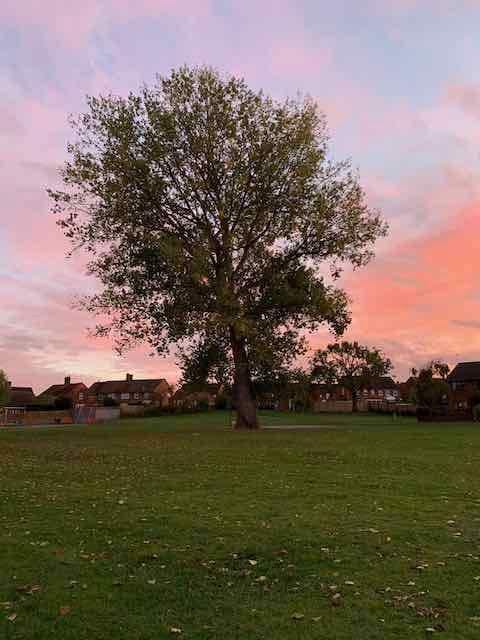Last week I was suddenly confronted with the shock and sadness of losing a tree. A shock and sadness that was shared in the many messages I received from friends and people from my childhood who I haven’t spoken to in years. A common grief and loss brought us together, for a grand black poplar who had lived with us as we grew up, who some of us could even see from our bedroom windows, who we walked past on our way to school, and who many of us met under on our path to deep and sustaining friendships.
The Anthropocene – the ‘age of humans’ – has the power to shock us all. The shock of losing the Big Tree Park Tree was perhaps surprisingly painful for many of us, invoking a grief both for our past selves and the memories we made under the boughs of the Big Tree, and for our future selves who won’t be able to make any more in that now changed, scarred, wounded place.
The great American conservationist and author Aldo Leopold said that the ‘One of the penalties of an ecological education is that one lives alone in a world of wounds.’
In reality, we all live an ecological education every day of our lives, from having to swerve around a stubborn pigeon to avoid hitting it with our bike, to mistaking the rustling of autumn leaves on the trees outside with rainfall.
We are all living ecological students and thus we all encounter, face off with, and have to somehow deal with a world of wounds, a world which can seem distant when we see floods and wildfires on the news.
We do, however, ‘face off with the physical’ every day, as Kae Tempest puts it in their song People’s Faces, but we don’t have to ‘live alone’ in a ‘world of wounds’, as Leopold put it. Bringing people who knew and cared for the Big Tree together in last week’s poem showed me the importance and power of sharing grief.
Grief is the price we pay for love, and if we cannot grieve for the loss of nature then we have lived truly unloved, unloving lives.
What life is this if we have no time to stand beneath the boughs? to paraphrase W. H. Davies’ Leisure.
Life in the Anthropocene then necessitates encountering, facing off with, and dealing with shock. But if grief is the price we pay for love, then surely shock is the price we pay for awe.
The question of awe is a fascinating one in Anthropocene studies – can humans experience that overwhelming sense of reverence, respect, wonder in a world full of wounds which we have created, in a world in which the human hand print has left its mark nearly everywhere?
Yes. Is my emphatic answer to this question. The notion of a pristine, untouched, ‘wild’ nature that awe can only be produced by is, as many social scientists, historians and others have argued, a myth.
Our everyday lives can truly be awe-some wherever we live.
It is a Thursday morning, just gone 8 o’clock in Cambridge, and already I’ve experienced awe, drawing back my curtains to reveal a crimson sky dashed with oranges, golds and reds as the sun starts to rise.
It’s that same feeling of being really, truly, stopped in your tracks, when everything is suspended just for a moment as that sight, sound, feeling, first lands. Awe’s first wave breaks over you, and for all the things you have to do today, in that moment, you are overawed.
Many years ago, I’m sure, for the first time I turned the corner of the street and was hit by this almighty presence, stood there: nothing between me and the Big Tree.
Shock and awe are two things we can’t live without, and neither should we try to avoid them, for a life without shock and grief is a life without awe and love.




